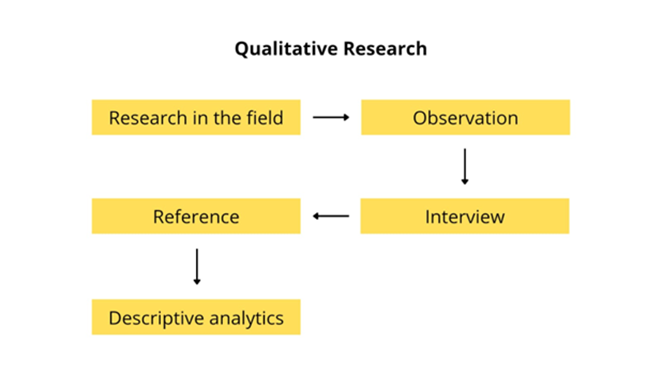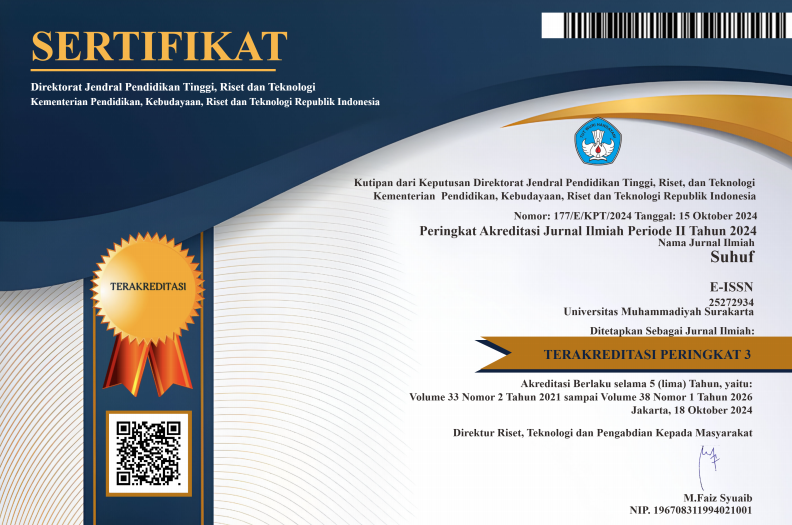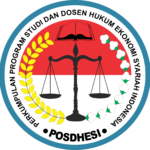A Development of the Turnitin System in Improving Plagiarism Detection for Islamic Religious Education Studies
DOI:
https://doi.org/10.23917/suhuf.v36i2.6275Keywords:
Turnitin system, Plagiarism detection, Islamic religious education, Academic integrity, ProfessionalismAbstract
The development of the turnitin system is used to minimize the similarities of words or sentences in writing articles or scientific papers. Turnitin, a widely used plagiarism detection software, provides a solution to identify and prevent plagiarism. However, it is important to adapt it to the context and specific needs of Islamic Religious Education studies at private Islamic universities. The proposed solution includes the integration of Turnitin with Islamic literature databases as well as the adjustment of detection algorithms to recognize religious texts. The existing problems include the impact of the turnitin system, development efforts and challenges, and problems related to plagiarism detection in the study of Islamic religious education. This type of research is called field research, which is to obtain data from direct research on the development of the turnitin system for improving plagiarism detection in Islamic religious education studies. The research is included in qualitative research with data collection techniques using direct observation in university libraries and supporting documents such as books, journals, and other sources. This Turnitin functions to check the level of similarity between sentences, words, paragraphs, and word structures of a written work with a written work made by someone or a student with someone else's previously published own. The development of the Turnitin system on each campus has its own advantages, but it also faces challenges from the side of students and the academic community related to maintaining academic integrity. This is essential for building trust, honesty, and creating a culture of excellence and professionalism while maintaining Turnitin's integrity. The biggest challenge faced is the emergence of the latest features provided by Turnitin, both turnitin draft coach and conventional turnitin.
Downloads
References
A. Savitri, Revolusi Industri 4.0: Mengubah Tantangan Menjadi Peluang di Era Disrupsi 4.0. Yogyakarta: Penerbit Genesis, 2019. [Online]. Available: https://books.google.co.id/books?id=dSvTDwAAQBAJ&dq=A.+Savitri,+Revolusi+industri+4.0:+mengubah+tantangan+menjadi+peluang+di+era+disrupsi+4.0.+Genesis,+2019.&lr=&hl=id&source=gbs_navlinks_s
F. R. N. Wulan, A. Kunaefi, and A. Permadi, "Deteksi Plagiasi Dokumen Skripsi Mahasiswa Menggunakan Metode N-Grams dan Winnowing [Detection of Student Thesis Document Plagiarism Using N-Grams and Winnowing Methods]," Simetris J. Tek. Mesin, Elektro Dan Ilmu Komput., vol. 9, no. 2, pp. 1021–1032, (in Indonesia), 2018, doi: https://doi.org/10.24176/simet.v9i2.2535.
K. A. N. Imania, "Problem Based Learning Dalam Meningkatkan Kemampuan Menulis Karya Ilmiah Mahasiswa [Problem-Based Learning in Improving Students’ Scientific Writing Skills]," PETIK J. Pendidik. Teknol. Inf. Dan Komun., vol. 2, no. 1, pp. 24–35, (in Indonesia), 2016, [Online]. Available: https://journal.institutpendidikan.ac.id/index.php/petik/article/view/1596
R. Hafizha, "Pentingnya Integritas Akademik [The Importance of Academic Integrity]," J. Educ. Couns., vol. 1, no. 2, pp. 115–124, (in Indonesia), 2021, doi: https://doi.org/10.32627/jeco.v1i2.56.
U. McGowan, "Pedagogy, Not Policing: Positive Approaches to Academic Integrity at the University.," Int. J. Educ. Integr., vol. 5, no. 1, pp. 35–37, 2009, doi: http://dx.doi.org/10.21913/IJEI.v5i1.482.
A. R. Moten, "Academic Dishonesty and Misconduct: Curbing Plagiarism in the Muslim World," Intellect. Discourse, vol. 22, no. 2, pp. 167–189, 2014, doi: https://doi.org/10.31436/id.v22i2.610.
T. Foltýnek, N. Meuschke, and B. Gipp, "Academic Plagiarism Detection: A Systematic Literature Review," ACM Comput. Surv., vol. 52, no. 6, pp. 1–42, 2019, doi: https://doi.org/10.1145/3345317.
A. Latifah, Nawassyarif, and C. Hudaya, "Strategi Perpustakaan dalam Mencegah Plagiarisme di Kalangan Mahasiswa Tingkat Akhir di Universitas Teknologi Sumbawa [Library Strategies for Preventing Plagiarism Among Final-Year Students at Sumbawa Institute of Technology]," in Prosiding Seminar Nasional Manajemen Inovasi, 2023, pp. 220–231. [Online]. Available: https://conference.uts.ac.id/index.php/SEMAI/article/view/335
E. Suryana, "Self-efficacy dan Plagiarisme di Perguruan Tinggi [Self-Efficacy and Plagiarism in Higher Education]," Tadrib J. Pendidik. Agama Islam, vol. 2, no. 2, pp. 214–237, (in Indonesia), 2016, [Online]. Available: https://jurnal.radenfatah.ac.id/index.php/Tadrib/article/view/1169
A. Risparyanto, "Turnitin sebagai Alat Deteksi Plagiarisme [Turnitin as a Plagiarism Detection Tool]," UNILIB J. Perpust., vol. 11, no. 2, pp. 126–135, (in Indonesia), 2020, doi: https://doi.org/10.20885/unilib.vol11.iss2.art5.
S. A. Mappasere and N. Suyuti, "Pendekatan Kualitatif," in Metode Penelitian Sosial, KulonProgo: Penerbit Gawe Buku, 2019, pp. 33–53. [Online]. Available: https://www.researchgate.net/profile/Ismail-Wekke/publication/344211045_Metode_Penelitian_Sosial/links/5f5c132ea6fdcc11640bd740/Metode-Penelitian-Sosial.pdf#page=42
A. Maisyarah and M. Z. Hamzah, "Zakat Distribution Management: A Systematic Literature Review," Suhuf Int. J. Islam. Stud., vol. 36, no. 1, pp. 95–108, 2024, doi: https://doi.org/10.23917/suhuf.v36i1.4357.
Y. Ardianto, "Memahami Metode Penelitian Kualitatif," Kementerian Keuangan Republik Indonesia. [Online]. Available: https://www.djkn.kemenkeu.go.id/artikel/baca/12773/memahami-metode-penelitian-kualitatif
T. S. Adiningrum, "Reviewing Plagiarism: An Input for Indonesian Higher Education," J. Acad. Ethics, vol. 13, no. 1, pp. 107–120, 2015, doi: https://doi.org/10.1007/s10805-015-9226-6.
H. Panjaitan, "Sanksi pidana plagiarisme dalam hukum positif di Indonesia," to-ra, vol. 3, no. 2, pp. 551–557, 2017.
M. Jannah, "Factors Leading to Plagiarism Among Acehnese EFL Students in Writing Assignments," UIN Ar-Raniry Banda Aceh, 2024. [Online]. Available: https://repository.ar-raniry.ac.id/id/eprint/34786/
B. Rosalina, Perlindungan Karya Arsitektur berdasarkan Hak Cipta. Bandung: Alumni, 2010.
E. Silalahi, D. Silalahi, M. I. Tarigan, and R. V. Sinaga, "Deteksi Plagiarisme sebagai Peningkatan Integritas Akademik [Plagiarism Detection as an Enhancement of Academic Integrity]," Kaizen J. Pengabdi. pada Masy., vol. 3, no. 1, pp. 27–33, (in Indonesia), 2024, [Online]. Available: https://ejournal.ust.ac.id/index.php/KAIZEN/article/view/3867
T. Batane, "Turning to Turnitin to Fight Plagiarism among University Students," J. Educ. Technol. Soc., vol. 13, no. 2, pp. 1–12, 2010, doi: https://www.jstor.org/stable/jeductechsoci.13.2.1.
C. Peterson and M. E. P. Seligman, Character strengths and virtues: A handbook and classification. New York: Oxford University Press, 2004. [Online]. Available: http://103.240.163.214:81/Digital Library /(08) फ्री ई- पुस्तकें (Free e-Books)/(01) Subject e-Books (विषय की पुस्तकें)/(12) Psychology (मनोविज्ञान)/9)Christopher Peterson, Martin Seligman - Character Strengths and Virtues_ A Handbook and Classification-(2004).pdf
B. Macfarlane, J. Zhang, and A. Pun, "Academic Integrity: A Review of the Literature," Stud. High. Educ., vol. 39, no. 2, pp. 339–358, 2014, doi: https://doi.org/10.1080/03075079.2012.709495.
K. Walchuk, "An Examination of the Efficacy of the Plagiarism Detection Software Program Turnitin," University of Ontario Institute of Technology, 2016. [Online]. Available: https://core.ac.uk/download/pdf/286916762.pdf
M. Murjazin, A. Nurhuda, L. Susanti, and Y. S. Azami, "Psychological and Physiological Motives in Humans (Study on Verses of The Qur’an)," Suhuf Int. J. Islam. Stud., vol. 35, no. 1, pp. 30–44, 2023, doi: https://doi.org/10.23917/suhuf.v35i1.22581.
M. F. Abad-García, "Plagiarism and predatory journals: A threat to scientific integrity," An. Pediatría (English Ed., vol. 90, no. 1, pp. 57.e1-57.e8, 2019, doi: https://doi.org/10.1016/j.anpede.2018.11.006.
I. Haris, E. Kusumarini, S. F. L. Zagoto, I. Kusumawati, and O. Arifudin, "Pengenalan Teknis Penggunaaan Software Turnitin Dan Mendeley Dekstop Untuk Meningkatkan Kualitas Karya Ilmiah Mahasiswa Baru [Technical Introduction to Using Turnitin and Mendeley Desktop Software to Improve the Quality of New Students’ Academic Writing]," J. Hum. Educ., vol. 3, no. 2, pp. 172–178, (in Indonesia), 2023, doi: https://doi.org/10.31004/jh.v3i2.187.
S. Bjelobaba, T. Foltýnek, I. Glendinning, V. Krásničan, and D. H. Dlabolová, Academic Integrity: Broadening Practices, Technologies, and the Role of Students: Proceedings from the European Conference on Academic Integrity and Plagiarism 2021, vol. 4. Heidelberg: Springer Nature, 2023. [Online]. Available: https://books.google.co.id/books?id=BfOkEAAAQBAJ&dq=D.+Bjelobaba,+Glendinning,+Krásnican,+"Academic+Integrity:+Broadening+Practices,+Technologies,+and+the+Role+of+Students,"+Proc.+from+Eur.+Conf.+Acad.+Integr.+Plagiarism,+2022,+doi:+https://doi.org/10.1007/978-3-031-16976-2.&lr=&hl=id&source=gbs_navlinks_s
M. Sozon, O. H. M. Alkharabsheh, P. W. Fong, and S. B. Chuan, "Cheating and Plagiarism in Higher Education Institutions (HEIs): A Literature Review," F1000Research, vol. 13, no. July, pp. 1–27, 2024, doi: https://doi.org/10.12688/f1000research.147140.2.
R. Yavich and N. Davidovitch, "Plagiarism among Higher Education Students," Educ. Sci., vol. 14, no. 8, pp. 1–18, 2024, doi: https://doi.org/10.3390/educsci14080908.
M. A. Shadiqi, "Memahami dan Mencegah Perilaku Plagiarisme dalam Menulis Karya Ilmiah [Understanding and Preventing Plagiarism in Academic Writing]," Bul. Psikol., vol. 27, no. 1, pp. 30–42, (in Indonesia), 2019, doi: https://doi.org/10.22146/buletinpsikologi.43058.
B. Marsh, "Turnitin.com and the Scriptural Enterprise of Plagiarism Detection," Comput. Compos., vol. 21, no. 4, pp. 427–438, 2004, doi: https://doi.org/10.1016/j.compcom.2004.08.002.
E. A. Özbek, "Plagiarism detection services for formative feedback and assessment: Example of Turnitin," J. Educ. Instr. Stud. World, vol. 6, no. 3, pp. 64–72, 2016, [Online]. Available: https://d1wqtxts1xzle7.cloudfront.net/50207558/08.ela_akgun_ozbek-libre.pdf?1478699911=&response-content-disposition=inline%3B+filename%3DPLAGIARISM_DETECTION_SERVICES_FOR_FORMAT.pdf&Expires=1729910428&Signature=RHeiiKanmD3boeJLNAM88LzNLJF5aDwW-hlNB0UC7W0TRGeZQBOQvuhU~9jHX33ECtF7l6hTUyQaz6RmC~4DIoHUecc5OahYAJxliQUee66eMMVd0wQsoTkfMeiQQ0tC2dCA2t179BXMRglQfAkTQVTPHJQrUe-uasd~vZDneJRBECnLtork9oJWnJnvewb-B4ZfS0I75nM-iNNmiV1aE8NjRVdv6zArOLC0afwu~OHa4WXY02DOHS6FtuGmYt0xpXT33L4lTQ6y5BQLpq~A5pwmBxEUxebycV51AV6ha48MbTtSTrP2K~o7Ac4fUPuyM1J-HGP1mz1a4YgUWUWyMw__&Key-Pair-Id=APKAJLOHF5GGSLRBV4ZA

Downloads
Submitted
Accepted
Published
How to Cite
Issue
Section
License
Copyright (c) 2024 Arilana Nur Izi, Fadhilla Nangroe Anggraini , Rahma Regita , Rabiatuladawiyah Rabiatuladawiyah

This work is licensed under a Creative Commons Attribution 4.0 International License.


















